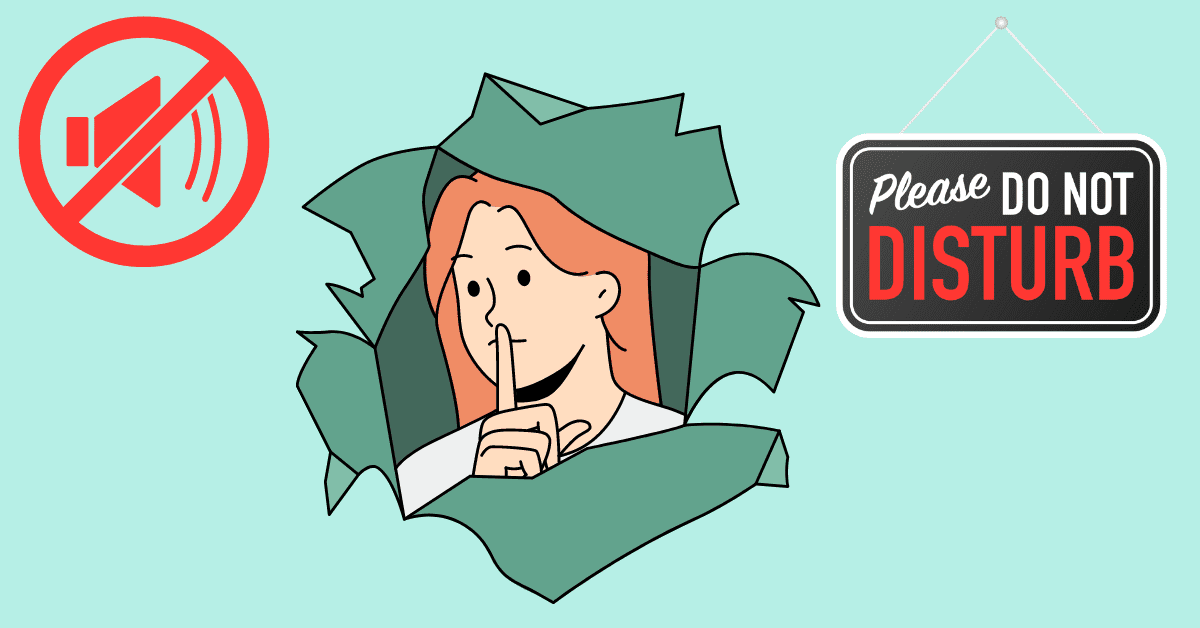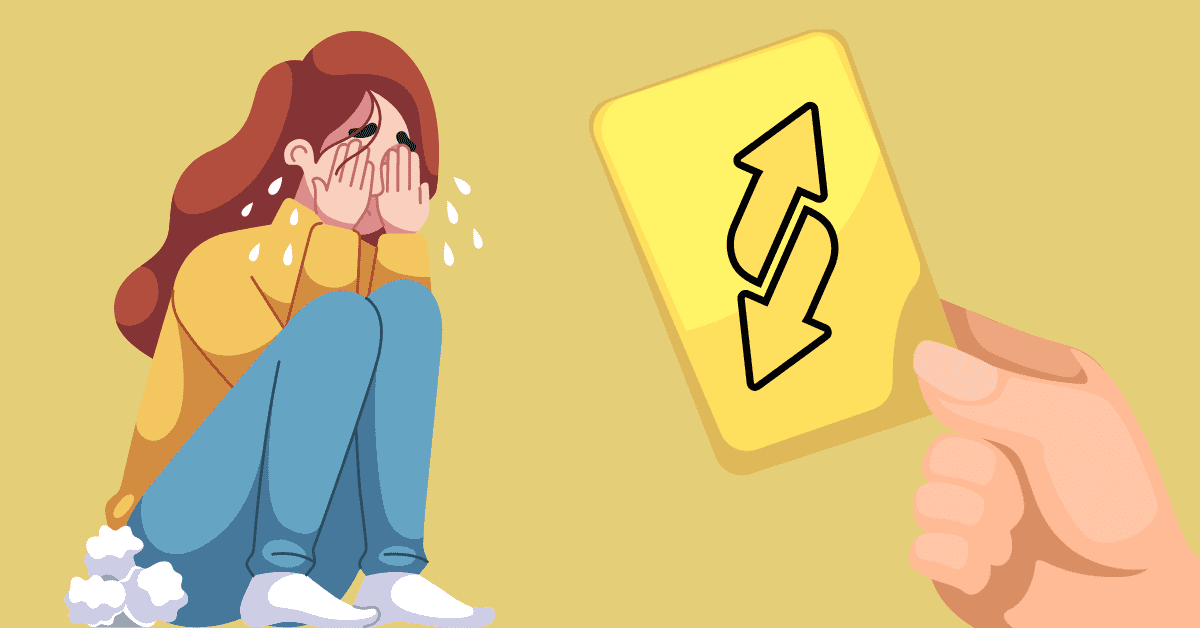If your ex-boyfriend or ex-girlfriend left you and entered a new relationship shortly or right after the breakup, you probably still love your ex and want your ex’s new relationship to be a rebound relationship. You want your ex to fail quickly, realize your importance, and run back to you for love, safety, and commitment.
Your ex’s new love interest makes you feel inferior, scares you, and causes you to analyze their compatibilities and the likelihood of making their relationship work. Since they’re a new couple, you notice mostly their positive traits and reasons they’re meant for each other. You’re forgetting that all new couples feel and act infatuated and that they don’t have to try very hard to get along.
They have nothing to disagree and argue about because they’re still in love and incapable of seeing each other’s flaws and getting on each other’s nerves. The relationship is too new for them to reveal their true personality traits and bicker. That comes much later (typically months into the relationship) when they stop pretending to be perfect.
How quickly they reveal their personality and maturity depends on how frequently they see each other, how much time they spend together, and how quickly they get to know each other. If they move in together right away, they might revert to their usual selves in as little as a month. Moving in together shortly after the breakup and after getting to know each other could indeed be a sign that they’re rushing and that they’re in a rebound relationship.
It could mean that they feel insecure and view relationships as tools to obtain reassurance.
Usually, couples get into a rebound relationship for the wrong reasons. They want some kind of benefit, perk, or feeling that gives their life a feeling of progression, safety, and comfort. They think another relationship will solve their personal problems and give their life meaning and things they can’t obtain on their own.
Such people jump into rebound relationships shortly after leaving the previous relationship and put all their eggs in one basket. They lack self-confidence and desperately hope the new partner will give them what they can’t get on their own.
This kind of thinking pushes them to do what’s best for them even if it’s not great for their new partner.
Rebound relationships fail for a reason. They end because people don’t put in much work but selfishly expect them to give them what they need. They think the new partner may replace their ex and help them love themselves.
And for a moment, he or she indeed may. The new person may keep them busy, entertained, desired, and happy. But when the relationship slows down and requires actual effort to progress, things could come to a halt. Rebounds could feel emotionally unfulfilled and start feeling tired of investing in someone who doesn’t make them feel how their ex made them feel.
That’s when it becomes clear that the new relationship is a rebound relationship and that it’s not going to work. It can’t work because it doesn’t hide the pain and suffering caused by the end of the previous relationship.
Unfortunately, though, not all new relationships are rebound relationships. They may start quickly after the end of a (serious) relationship, but that doesn’t mean dumpers can’t be in a new serious relationship. The quick start of a new relationship usually indicates that dumpers lined up someone new or that they cheated and monkey-branched to another person.
Because they talked to another person behind their ex’s back and/or physically or emotionally cheated on their ex, they made it possible for themselves to start a new relationship literally a second after breaking up with their ex. The breakup talk was merely the official end of the relationship. The real breakup happened days or weeks before the breakup when they disconnected from their ex and reattached to someone else or to the idea of being with someone else.
Dumpees wish all relationships that start quickly after a breakup were rebound relationships, but I’ve seen enough cheaters and people in a hurry to date to know that they’re plenty capable of starting a new connection from scratch with someone new. Moving on with someone else quickly didn’t stop them from continuing that relationship for months or years.
It made them start a real/normal relationship rather than a rebound one.
When it did end quickly, it didn’t end because they were in a rebound relationship but because they were incompatible, immature, or not right for each other. People enter rebound relationships only when they’re emotionally unavailable for a new relationship.
This means they still have feelings for their ex and can’t connect or stay connected with another person. Everything the new person does or doesn’t do makes them remember their ex and miss him or her. This is by definition a rebound relationship that is doomed from the beginning. It’s extremely unlikely for a relationship like that to work for long.
Either the new person gets tired of not being reciprocated and taken for granted or the rebounder feels overwhelmed emotionally and unfulfilled. They make each other feel unwanted emotions and feel misunderstood and underappreciated.
For a rebound relationship to work, both people must be understanding of each other’s emotional capabilities and willing to take things super slow. If someone expects too much or expresses too much emotion, pain, or discontent, the relationship is likely to end as it doesn’t yet have the resilience (long-term relationships have) to overcome issues.
It can become more resilient with time, communication, bonding, love, purpose, and mutual respect. A rebound relationship, sadly, lacks most of these things as the rebounder enters the relationship to take from it rather than invest in it.
In today’s article, we discuss whether your ex is in a rebound relationship or a normal relationship and answer the most common rebounding questions.
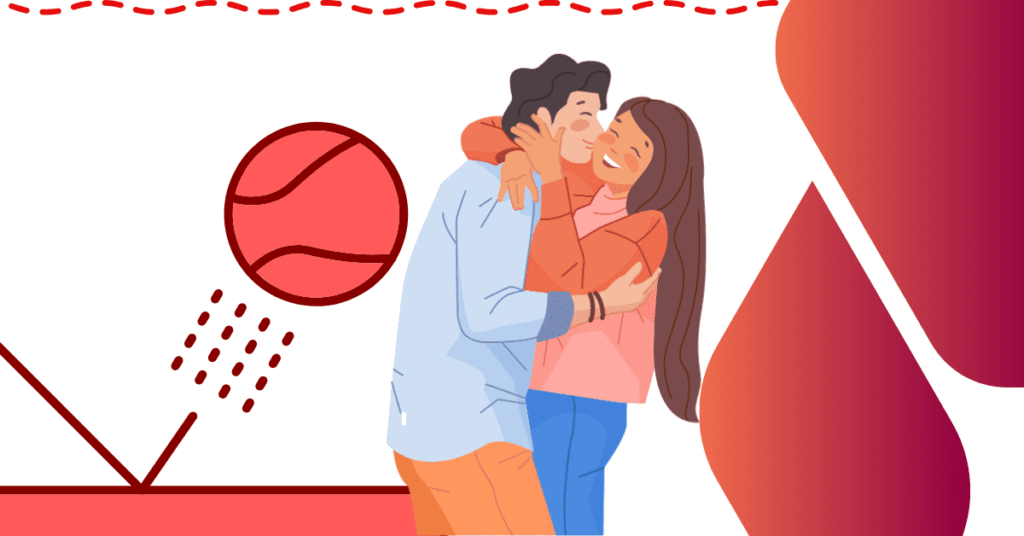
What is considered a rebound relationship?
A rebound relationship isn’t just any new relationship that starts quickly after the breakup. A rebound relationship is a relationship that starts for the wrong reasons. It’s a relationship in which one or both parties look for something they can’t get due to some recent traumatic experience.
The most common traumatic experience that makes them rebound is a breakup, but it can also be death in the family, emotional unavailability, commitment issues, extreme fears of abandonment, trust issues, or any serious problem or emotion they haven’t dealt with yet.
When a person isn’t ready for a new serious relationship but gets into one anyway, he or she doesn’t care about commitment and doesn’t have the energy and willpower to get to know the other person. All he or she wants are the benefits the relationship provides. Benefits such as sex, ego boost, companionship, distraction, and the feeling of progression and importance.
The relationship puts a bandage on his or her unresolved problems and emotions and makes the rebounder feel euphoric and distracted. Sadly, fantasy doesn’t last long. Things start falling apart when the relationship progresses and demands the rebounder to adapt and put in more time, energy, and commitment.
That marks the beginning of the end of the rebound relationship because it lacks authenticity, feelings, purpose, and dedication.
Therefore, a rebound relationship is any relationship that can’t progress naturally due to past issues and withstand relationship problems. A healthy couple discusses their differences and pain whereas a rebound couple runs away from them and considers the relationship difficult and emotionally demanding.
If your ex is in a rebound relationship, your ex won’t only struggle to form the bond or keep the bond going but also struggle to find the energy to address relationship issues and see the point in investing in something that exhausts him or her. The relationship will become a chore for your ex and cause your ex or the new person to initiate the breakup.
Someone will probably get hurt. That someone will be the more invested person with more relationship expectations. Dumpers typically don’t get attached. They get into relationships purely for entertainment and validation purposes and exit them when they can no longer get what they need.
When they exhaust the relationship and get tired of meeting their partner’s expectations, they withdraw, pull away, and search for an opportunity to end the relationship.
So bear in mind that a rebound relationship is a forced relationship that can’t move past the infatuation stage. It falls apart when expectations outgrow the couple’s emotional capabilities and drive a wedge between them. The wedge then causes them to think negatively about each other’s personality, demands, and ways of expressing and coping with discontent.
It’s only a matter before they encounter an issue they lack the resolve to overcome.
Having said that, here’s what is considered a rebound relationship.
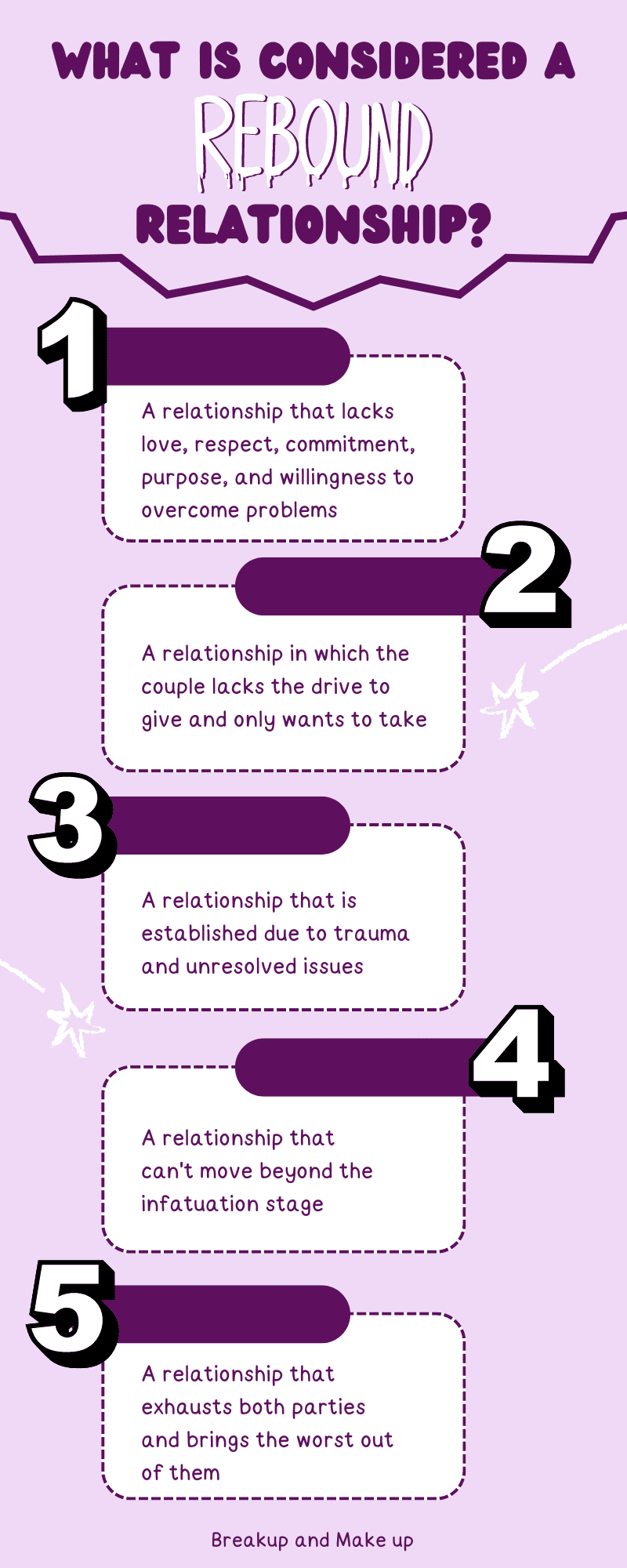
Many people think a rebound relationship always moves quickly, but that’s not exclusive to rebound relationships. Normal/healthy relationships also progress fast. They make couples feel excited and tempt them to spend a lot of energy and time with the new person.
The difference between rebound relationships and non-rebound ones is that rebound ones eventually run out of steam and hit an obstacle they can’t overcome. In contrast to normal relationships that successfully deal with problems and difficult feelings, couples in rebound relationships tire themselves out and abandon their commitments to invest in themselves.
They don’t see the point in staying in a relationship that feels like a chore and doesn’t fulfill their wants and needs.
How long do rebound relationships last?
Rebound relationships last anywhere between a week and a few months. They tend not to last longer than 4 months because that would require immense willpower and commitment when unhappiness occurs. Rebounders would have to be afraid of being alone, have no friends, or rely on the new person for various problems and lackings.
From what I see, 2 – 3 months seems to be the average rebound time. Most rebound relationships fail when the relationship stops empowering them and causes them to put more effort into the relationship than they can.
This can happen two weeks into the relationship or 3 months later. It varies for each couple and their way of coping with unwanted thoughts, emotions, and expectations. If they lack patience and coping mechanisms and feel a lot of unhappiness and pain, they tend to leave very quickly as the new relationship feels difficult and unproductive.
It serves no purpose to either of them.
Usually, the rebounder decides to terminate the relationship, but sometimes, the other person initiates the breakup first. When the other person leaves, he or she feels tired from investing time and unreciprocated emotions in the stagnant relationship and considers his or her partner incompatible.
He or she doesn’t understand that the relationship came to a halt due to his or her partner’s unprocessed past and feelings. He or she is clueless as to what went wrong because the rebounder doesn’t admit that he or he still loves the person who recently abandoned him or her or that he or she needs more time to leave the past behind.
Hence, complete transparency is seldom a part of a rebound relationship. Very few people tell the person they’re seeing that they’re still dealing with the consequences of their divorce or breakup and that they want to take things slow. Because they’re not honest, they fail to lower their expectations and increase their patience—and feel many emotions they and their partner don’t want to feel.
Since they started the relationship for the wrong reasons and failed to set healthy boundaries and expectations it’s only a matter of time before they lose interest and go their separate ways.
Do rebound relationships ever last longer than a few months?
Sometimes rebound relationships last longer than a few months, but it’s extremely rare. People tend not to have the kind of energy and tolerance needed to take care of another person’s emotional needs and expectations when they can’t even take care of theirs. They tend to call it quits and focus on people who can meet their expectations and fill their void.
When rebounds last longer than what is normal for rebound relationships (4 months), it’s because they take things snail-slow and/or fear being alone or abandoned and don’t have anyone or anything else to lean on. The only person who can distract them and make their problems from the past better is the person who continues to validate them and make them feel safe.
If a rebound relationship lasts longer than a few months, it doesn’t necessarily mean that it will transform into a normal relationship. It’s extremely challenging for a relationship that lacks love (genuine reasons for existing) to develop into something more. Usually, the couple breaks up when they fall out of love and/or meet someone who can give them what they seek.
Is my ex in a rebound relationship?
You probably feel hurt by your ex’s abandonment and new relationship and want to know if your ex is in a rebound relationship and if there’s any chance of him or her coming back. You want your ex’s relationship to fail so that your ex gets hurt, recommits to you, and makes you feel loved and needed.
The thought of your ex’s new relationship working out is making you obsessed with your ex and hurting your self-esteem. It’s making you preoccupied with your ex and his or her new partner and causing you to fear that your ex will be happier and more successful without you.
What you’re forgetting is that your ex’s relationship just started and that it’s nearly impossible for it to be worse than your long-term relationship. Long-term relationships become predictable over time and stop feeling super exciting.
Your ex’s new relationship will also slow down and lose its excitement. It may not happen today or even next week, but eventually, they’ll get familiar with each other and take each other at least a bit for granted. It happens to all couples, whether they get along or not. When their relationship gets old, they stop feeling infatuated and face reality.
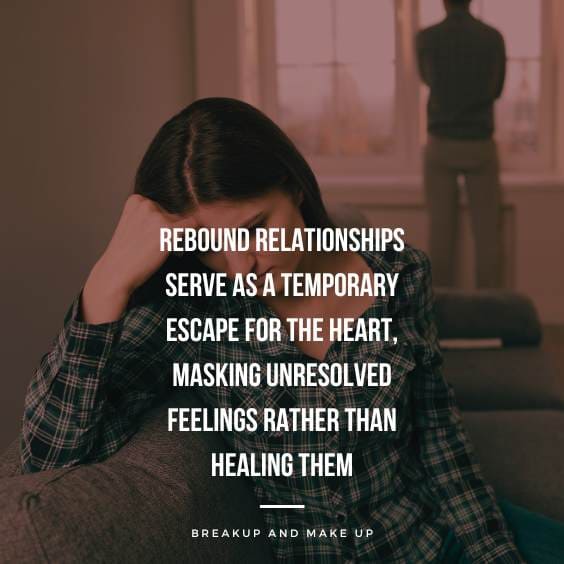
You’re probably dying to know if your ex’s new relationship is a rebound or a normal relationship.
To put it simply, your ex is in a rebound relationship if you had a long-term (serious) relationship with your ex and left your ex less than a few months ago. Your ex hasn’t had enough time to process the separation, so your ex’s new relationship implies that your ex is hungry for validation and hoping the new person will fill the void.
Your ex sees the new relationship as a shortcut to emotional recovery and temporary happiness.
However, if your ex left you, then your ex probably isn’t struggling to be happy. Your has processed the end of the relationship already and is doing just fine. Your ex is ready to invest in another person and is dating again to create something meaningful and long-lasting.
Of course, some dumpers don’t want anything serious right away. They just want a friendship with benefits that makes them feel attractive and boost their ego.
Such dumpers convince themselves they just want some fun and that relationships are difficult. Their relationships fail when their partner develops feelings and wants more than they can give. I don’t think that counts as rebounding as rebounds are relationships that fail when people want them to succeed but aren’t ready for them to succeed.
I know you don’t want to hear this, but dumpers don’t rebound very often. To rebound, they’d have to still love their ex and be emotionally incapable of starting a new relationship. They’d have to feel rejected and hurt like dumpees.
They tend to rebound when they become dumpers by force rather than choice. When their ex cheats on them or does something unforgivable that forces them to terminate the relationship on the spot even though they still have feelings, they may rebound if they get into a new relationship too quickly.
Other (most) dumpers, though think things through and lose feelings before they initiate the breakup. They leave their ex when their ex’s presence or behavior suffocates them and leaves them with no choice but to distance themselves from their ex. Distance makes them feel relieved and happy and lets them date other people right away if they want to.
So if you want to know if your ex is in a rebound relationship, the easiest way to know is to remember why the breakup happened and how your ex felt before, during, and after the breakup. If your ex lost interest very quickly and didn’t have the time to detach, your ex’s new relationship’s main purpose is probably to replace you.
This means your ex is thinking about you non-stop and looking for you in someone else. Your ex won’t find a person like that because he or she doesn’t exist. There’s only one of you.
But if your ex had ages to detach and find a chance to leave you, then your ex feels relieved by the breakup and doesn’t obsess over you. Your ex hopes that the person he or she is seeing is completely different from you.
Your ex’s readiness for a new relationship and reasons for committing to a new person tell you if your ex is in a rebound relationship or a normal one.
Will my ex come back after a rebound?
If your ex is in a rebound relationship, your ex will probably come back when the new relationship ends. Your ex will get hurt and remember that he or she still loves you and desires your affection. Failure and pain will make your ex stop searching for happiness in new people and return to someone he or she is familiar with and won’t be disappointed by.
Your ex could also take a break from dating and move on, but that probably won’t happen if your ex loves you and depends on you for healing and relationship benefits. It’s much more likely that your ex will stop resisting the urge to reconnect with you and start a new relationship.
I don’t have a crystal ball, but many dumpers come back when they fail with someone new and engage in reflection. It’s not just rebounders who return, but also those who don’t love themselves and feel their life lacks direction and purpose. Regretful dumpers in general come back after dating someone else because they realize it won’t be easy to find what they’re looking for.
They realize the relationship with their ex was good but that they didn’t appreciate it at the time.
Such a realization tempts them to reach out to their ex and ask their ex for forgiveness and commitment. It makes even the most stubborn dumpers lower their pride and want their ex to help them.
If a rebound relationship doesn’t make your ex come back, your ex probably won’t come backany time soon. He or she will get to know someone else and keep trying to establish a functional long-lasting relationship. That doesn’t mean your ex will never come back, but it will likely take your ex a long time and many (romantic) failures to discover the value you bring to the table.
Do no contact when your ex is in a rebound!
Whether your ex is in a rebound or normal relationship, do no contact with your ex. Show your ex you respect his or her new relationship and need for space and that you won’t beg your ex for commitment. Your ex must see that you respect him or her and yourself enough not to act on pain and make things awkward for both of you.
No contact is extremely important. It could help you retain your value and bring your ex back when he or she gets in trouble and improves his or her perception of you. It’s not a guarantee (nothing is), but permanent no contact is the only ex-back technique that will give your ex what he or she needs to be happy. Every other (manipulation technique) will make things worse because it will force your ex to feel something he or she isn’t ready for and doesn’t want to feel.
If you try to text your ex back or do a time-limited no contact rule, your ex will see that you’re trying to make him or her feel something for you and that you haven’t given up on getting back together. Your actions will essentially scare your ex away and make it harder to get back together.
So if you want to make your ex come back after a rebound or a normal relationship, give your ex space and focus on yourself. By focusing on yourself and anyone but your ex, you’ll force your ex to think about you when his or her new relationship loses momentum and triggers the desire for validation and bonding.
Regardless of what your ex does, stay in no contact indefinitely. Don’t think your ex has had enough time to miss you—and decide to check up on your ex. If your ex doesn’t reach out, your ex doesn’t want you back. Your ex isn’t waiting for you to save him or her from an unfulfilling relationship.
Think of it as your ex waiting to fail badly enough to experience pain and miss you so much that the thought of losing you and being with you causes your ex anxiety.
For now, you have to be patient and forget about your ex. Do no contact when your ex is in a rebound relationship and you’ll either get a chance to reconcile with your ex or move on and find romantic success with someone else.
Is your ex in a rebound relationship? How are you handling it? Share your post-breakup plans and goals in the comments below.
And if you want our help with your ex’s rebound, get in touch with us here.

My name is Zan, and I’m a writer and a breakup analyst. I write relationship and breakup articles and strive to strike a harmonious balance between empathy and realism. If you appreciate my content, feel free to leave a comment or support me by buying me a ko-fi.
